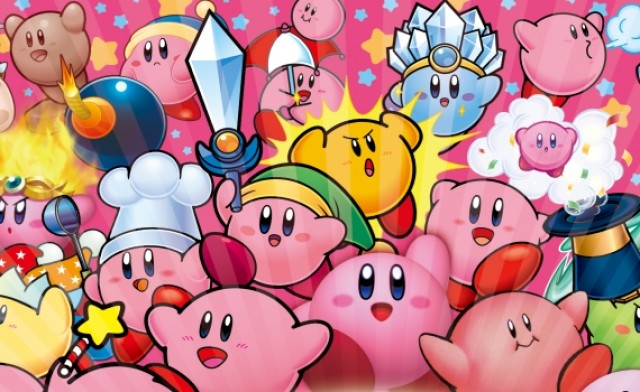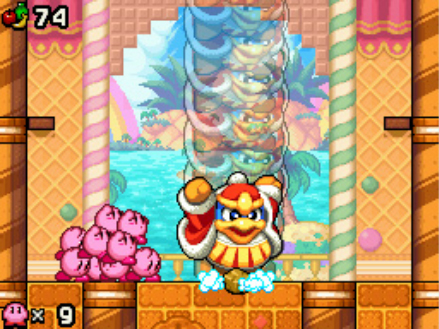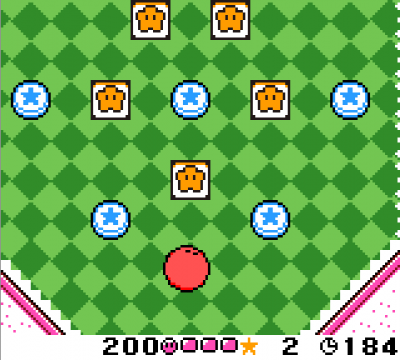
This may come off as blasphemous to die-hard Nintendo fans, but I used to not care about Kirby. Some of the most beloved games in the series, such as Kirby’s Adventure and Kirby Super Star, were not that impressive to me upon playing them. I was able to understand why people liked them, as Kirby’s unique copy ability help differentiate the games from other platformers, but I never ranted and raved about these titles. I’ve only been able to acknowledge them as decent games, and nothing more.
Yet, when I started to get my hands on games like Kirby Tilt ‘n’ Tumble and Kirby Mass Attack, I finally became a believer. At that point, I didn’t just like Kirby games, I loved them!
Kirby Tilt ‘n’ Tumble made use of its built-in accelerometer to completely change the way Kirby controlled, which was an incredible feat for a Game Boy Color game. Kirby Mass Attack also deviated from established mechanics, and turned Kirby into an incredible RTS-like adventure game. Because these games were drastic departures from their predecessors, they completely hooked me in.

Just in case someone plans on throwing toilet paper at my house after reading this, I want to stress that I’m not knocking the main games in the Kirby series. I play and enjoy them from time to time, and I think it’s great that lots of people find them to be fantastic games. But, I think there is something phenomenal about the amount of times Kirby broke its own genre conventions. Jon’s article in our sequel issue explored how franchises could become stagnant if they rely on the same game mechanics for each new iteration, making the variety found in Kirby games a breath of fresh air.
Every single genre caters towards a specific kind of gamer. When a franchise sticks with just one style of play, it’ll typically attract the same target audience every time. But, when a series refuses to be defined by its set genre, spin-offs are spawned that broaden the franchise’s demographic as a whole. By establishing Kirby as more than a platformer, people that never took interest in the series in the past have a chance to become a new fan. I should know, because I was one of those people!
I know some might cringe when they hear the word spin-off, and I don’t blame you for doing so. Some of my favorite franchises, like Banjo-Kazooie and Star Fox, have let me down by completely changing all established mechanics in newer games. I do like Nuts and Bolts and Star Fox Adventures, but after waiting years for a new game in each franchise, these iterations were not what I was expecting and disappointed me as a result. To that end, spin-offs can be potentially harmful to some extent.
But at the same time, spin-offs have the potential to be something huge. Mario Kart started with humble beginnings when it first launched on SNES, but today, this spin-off series has found massive success. In fact, Mario Kart Wii is currently second best selling Mario game of all time, proving that sticking to set conventions isn’t always the best course of action.

Developer HAL Laboratory knew this, and decided to make Kirby a genre-less entity as early as Kirby’s Pinball Land on Game Boy. When the game went on to sell an astounding 2.19 million units globally, it became clear that Kirby had potential to become more than Nintendo’s newest platforming mascot. This paved the way for the development of experimental, inventive gameplay types for the character, creating a wider appeal that reached new audiences.
Even though HAL has been returning to Kirby’s platforming roots as of late with games like Kirby’s Return to Dreamland and Kirby: Triple Deluxe, it still realizes the importance of creating new ways to experience a Kirby game. In a recent interview with CVG, director Shinya Kumazaki had the following to say:
We have our own ideas about what Kirby is, and how Kirby should appear, and what Kirby should do. But at the same time while we feel like we’re protecting Kirby, we also realize in some ways that’s restricting what Kirby can be and what Kirby might be…It’s essential for us to take the rules we’ve created and sometimes throw them out the window and start over and think of new things. And Nintendo helps us when we have to do that and adds new challenges for us to face and overcome, and in that way the series continues to grow.
Kumazaki perfectly explains the benefits of Kirby’s status as a genre-less property. His team realizes that Kirby is not just one thing that is for one specific group of people, leaving them to constantly think of ways to innovate and broaden the scope of the series. Even in Kirby: Triple Deluxe, HAL still put sub-minigames like Kirby Fighters and Dedede’s Drum Dash to help shake up the franchise. Both of these look fantastic, making me anticipate the next-full blown spin-off title even more.
What’s your opinion on spin-offs? Do you like it when a series embraces a different gaming experience, or does it fill you with violent rage? Let us know in the comments below!




 ShareThis
ShareThis







Spot-on, Anthony! Kirby is an amazing vehicle for basically any type of game a developer wants to make. Just look at Canvas Curse, which is still one of the most brilliant uses of the DS’s touch screen. An awesome character and an awesome franchise.